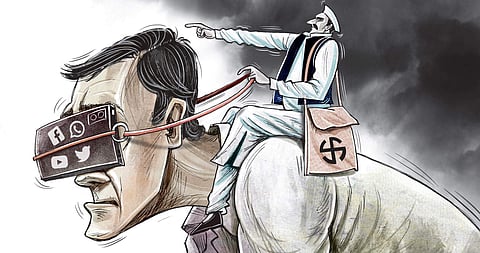

Social media is like Aladdin’s genie; you need a master to control it. And it is the responsibility of the institutions to control the genie
Giuseppe Porcaro’s novel Disco Sour (2018) depicts a dystopian future following a continental civil war. Bastian Balthazar Bux, a key member of The Federation, the European network of civil society and local governments, discovers a plan by someone named Zukowsky to sell Plebiscitum, a dating-style app that is meant to replace elections with a simple swipe, at a conference in Chile that Bux is also invited to attend. The story is about Bux’s attempt to save democracy from being swiped away.
The predicted techno-future of democracy portrayed in Disco Sour must have been motivated by the ‘Swipe the Vote’ campaign of dating app Tinder, released during the 2016 US presidential campaign. It let people swipe on issues in order to match them with the most appropriate candidate. Is that the future of democracy?
In 2011, the scent of jasmine from the Tahrir Square was indeed initiated by a Facebook post of a 29-year-old Google marketing executive. Internet also helped the Zapatista uprisings in Mexico.On the other hand, rumours and fake news spread like fire fanned by the wind, through Facebook posts, tweets, and WhatsApp messages, are capable of unleashing catastrophes.
The riot in the UK in August 2011 originated from some tweets! During the devastating Ebola outbreak in West Africa and elsewhere in 2014, incorrect posts claiming that Ebola could spread through the air, water or food were continuously shared causing fear. There are allegations that social media played a role in spreading fear that led to lynchings and riots in different parts of India.
How can the internet influence a democracy? The response has evolved from starry-eyed hope to critical realism to despair within a span of less than two decades. And these came about as the use of social media greatly rose during this period. Social scientists will continue to struggle finding the exact role played by social media—including Facebook and Cambridge Analytica—in the 2016 American presidential election.
Facebook has grown bigger than any state now and the Twitter accounts of politicians across the world garner thousands of retweets from bots under fake names and identities. Social media had a definite role in Brexit, and helped achieve the slender margin that led to Britain leaving Europe. In the backdrop of the just-concluded Indonesian elections, both President Joko Widodo and his challenger Prabowo Subianto are reported to have engaged numerous ‘buzzer’ teams, which allegedly spread fake news and paid news through dummy social media accounts.
During last year’s Brazilian election, supporters of the eventual winner Jair Bolsonaro are said to have used WhatsApp to deliver an onslaught of daily misinformation straight to the phones of millions of Brazilians. A paid keyboard army was reported to have orchestrated Rodrigo Duterte’s victory in the Philippines in 2016. Fake news in social media shadowed elections across different continents—in Venezuela, Kenya, France, Malaysia and the US.
The 2008 and 2012 American presidential elections, both won by Barack Obama, were the first major electoral battles to use social media as a winning strategy. The way social media was used in India’s 2014 Lok Sabha elections was somewhat similar in nature to the 2008 US presidential election. But while social media acted as an X-factor in 2014, it might have become a weapon this time around.
With 900 million voters, 460 million internet users, 355 million smartphones, 314 million Facebook accounts and 200 million WhatsApp users in India, this Lok Sabha election is simultaneously a special opportunity and an agnipariksha for the social media companies as well. Firms like Facebook, Twitter, Google, WhatsApp and ShareChat, together with the Internet and Mobile Association of India met the Election Commission of India to discuss the role to be played by social media when the Model Code of Conduct is in force.
The companies are now committed to accepting only pre-certified political advertisements, sharing expenditure on them with the EC, and adhering to the ‘silence period’ that comes into effect 48 hours before the polls. They are using Artificial Intelligence to spot and remove shady posts from social media platforms. But how effective can this be? This allegedly failed in Brazil recently. As fake news in social media spreads at a lightning speed, they might reach millions of smartphones before the harmful posts are detected and removed, if at all.
About two in five people, or more, are floating voters —either completely independent, or soft supporters of some party or other, who change their support easily. And a relatively higher proportion of such people are exposed to social media. In our electoral framework, even a 2-3 per cent swing in any direction can be decisive. And although the exact influence of social media is unknown, it might very well be more than this.
It is a WhatsApp-defined world, and we have reason to take it seriously when a stand-up comedian says that WhatsApp is the best-known newspaper of the country. And, understandably it is a daunting task to control fake news, the toxic cocktail of democracy, in social media. Social media is like Aladdin’s genie; you need a master to control it. And it is the responsibility of the institutions to control the genie.
Well, will Bux be able to make it to the conference to Chile to prevent elections from being replaced with a simple swipe?